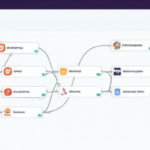The rise of digital transformation in higher education has been a game-changer, reshaping how institutions operate, engage students, and leverage technology. This blog explores how two prominent universities, Georgia Tech and Duke University, have embraced innovative IT strategies to enhance their educational frameworks and improve student experiences.
The Digital Transformation Journey
Digital transformation involves integrating technology into all areas of an institution, fundamentally changing how it operates and delivers value to students. Both Georgia Tech and Duke are at the forefront of this transformation, implementing advanced technologies that optimize learning and administrative processes.
Georgia Tech: Leading the Charge
Georgia Tech has positioned itself as a leader in technological innovation in education. The institute’s commitment to research and development in artificial intelligence and data analytics has allowed it to tailor educational experiences based on data insights. For example, the Georgia Tech AI Institute focuses on creating machines that enhance human capabilities rather than replace them.
Additionally, Georgia Tech utilizes platforms like Canvas and Yellowdig for interactive learning, enabling collaborative environments and enhancing student engagement. The integration of these platforms has proven beneficial for both educators and students, leading to a more personalized learning experience.
Duke University: Innovating for the Future
Duke University has also made significant strides in digital transformation. The university employs an extensive IT infrastructure to support teaching and research, focusing on cloud computing and big data. Duke’s innovative use of the Duke Compute Cluster enables researchers to process large datasets efficiently, promoting groundbreaking discoveries.
In addition, Duke’s mobile applications enhance student-life integration, providing easy access to campus resources, helping students navigate their educational journey, and improving overall satisfaction.
Comparative Analysis
While both universities are committed to digital transformation, their strategies highlight unique paths. Georgia Tech’s focus on enhancing human-technology collaboration contrasts with Duke’s emphasis on utilizing cloud technologies for research efficiency. This diversity in approach illustrates that there isn’t a one-size-fits-all methodology for institutions undergoing digital shifts.
Challenges in the Transformation Process
Despite their achievements, both institutions face challenges such as ensuring cybersecurity, managing administrative processes effectively, and maintaining clear communication between departments. Addressing these challenges is critical to sustaining momentum in their digital transformation journeys.
Conclusion: The Future of Education is Digital
Georgia Tech and Duke University are exemplary models of how educational institutions can adopt innovative IT strategies amidst the digital revolution. Their commitment to enhancing learning experiences through technology not only benefits their current students but also sets a standard for how education will evolve in an increasingly digital world.








